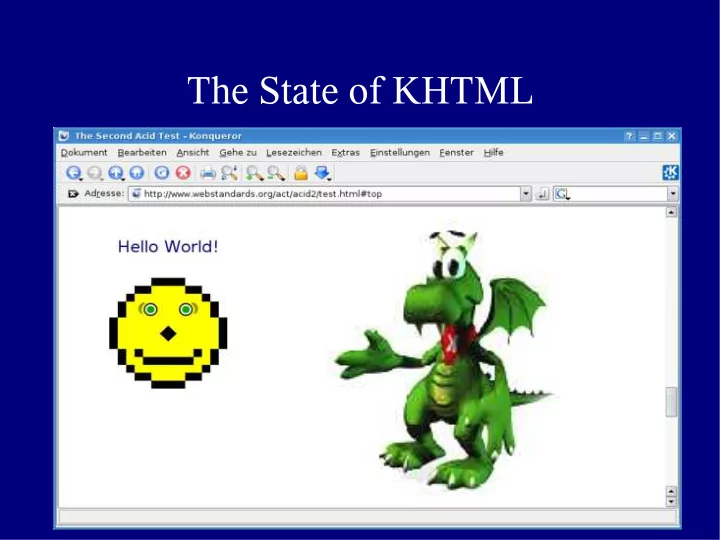

The State of KHTML
In The Beginning...
Why KHTML Is Important ● KHTML is critical to the success of KDE ● Provides a fast, light web browser and component that tightly integrates with KDE ● Gives us higher visibility as a project: “the web” is much larger than the Linux desktop community ● It's a great testcase for our existing infrastructure
What We Have ● CSS 1 / 2 parts of 3 ● Java applets (modular) ● SSL ● ECMAScript 1.2 ● Wallet ● XHTML ● KDE integration ● HTML up to 4.x ● Basic LiveConnect ● “AJAX” support ● KJSEmbed derived ● NS plugin support from KJS
What We Don't Have ● Internal SVG support ● DOM bindings to non- C++/non-JS ● Latest NSPlugin API ● Opacity (Qt4 should support help) ● XBL ● Lightweight widgets ● Content Editable
KHTML – From Industry ● Great alternative to Gecko and Opera – small, fast, easy to understand, standards compliant ● In use in many embedded platforms as well as desktop browsers – Safari, Nokia, Omni, etc ● Forking is a problem ● Gaining respect from other browser vendors ● Could become a major player with enough 'unity' - >= 10% market share
Can We Complete The “Merge”? ● “Merging” is not really feasible at this point ● Unity – a port of WebKit to Qt4: – KPart, KIO development is underway – Ca n co-exist with KHTML from KDE – Works 'now' – Abstraction layer in WebKit makes it relatively easy to port – Open questions: How do we avoid re-forking? How do we merge our own work?
If We Go Unity, What Do We Gain? ● Support for many of the functions we lack as described earlier – XBL, content editable, etc ● Bug-for-bug compatibility with many major browsers – This is important for industry acceptance ● More developer resources ● Larger user base for testing and bug reporting ● Easier embedding in Qt-only apps ● Portability – the best Win32 port?
What Do We Lose? ● Some possible trade-offs in bug fixes and performance – Esp: Work by Maksim, Germain, Allan ● Some flexibility in development model – We need to work as a team with Nokia, Apple, etc ● Complete authority over the codebase ● Some functionality needs rewrite: – Form widgets, Java applets, nsplugins, wallet, KDE integration
Working With Working Groups ● W3C – Security ● Plugin Futures ● W3C – General ● SVG ● WhatWG – HTML5 ● Browser testing organization ● ECMA – JS ● JavaScript as a ● CA-Browser Forum standard programming ● KHTML/WebKit language meetings
Discussion ● Do we want to pursue WebKit/Unity? – If so, how do we approach it? – What will the impact be on our community? ● How do we avoid losing our own work? ● How do we ensure that we are equal players in a joint effort with Apple, Nokia and others? ● How can we grow developer-interest without cannibalizing our existing developer base?
George Staikos <staikos@kde.org> aKademy Sep 23, 2006
Recommend
More recommend